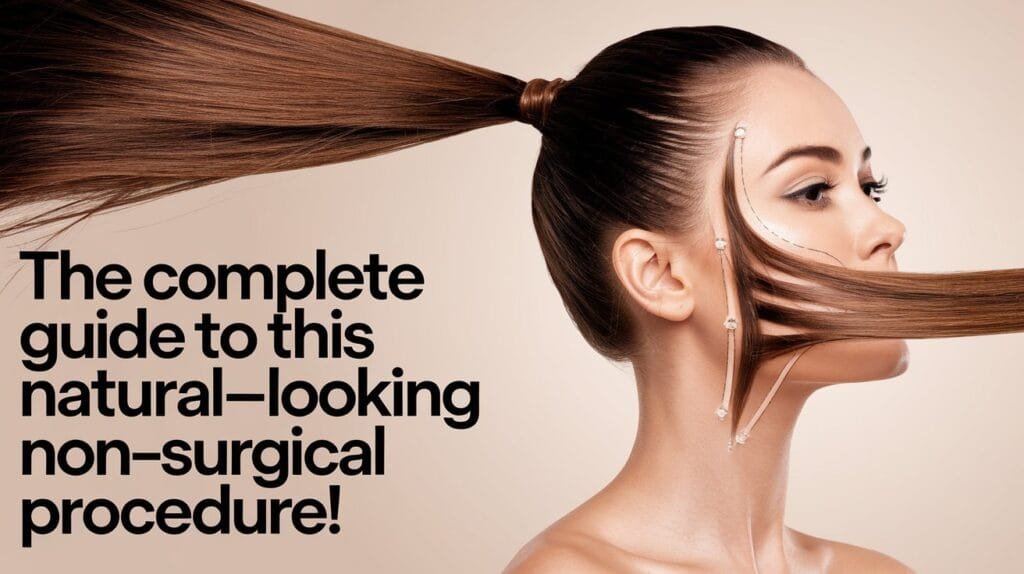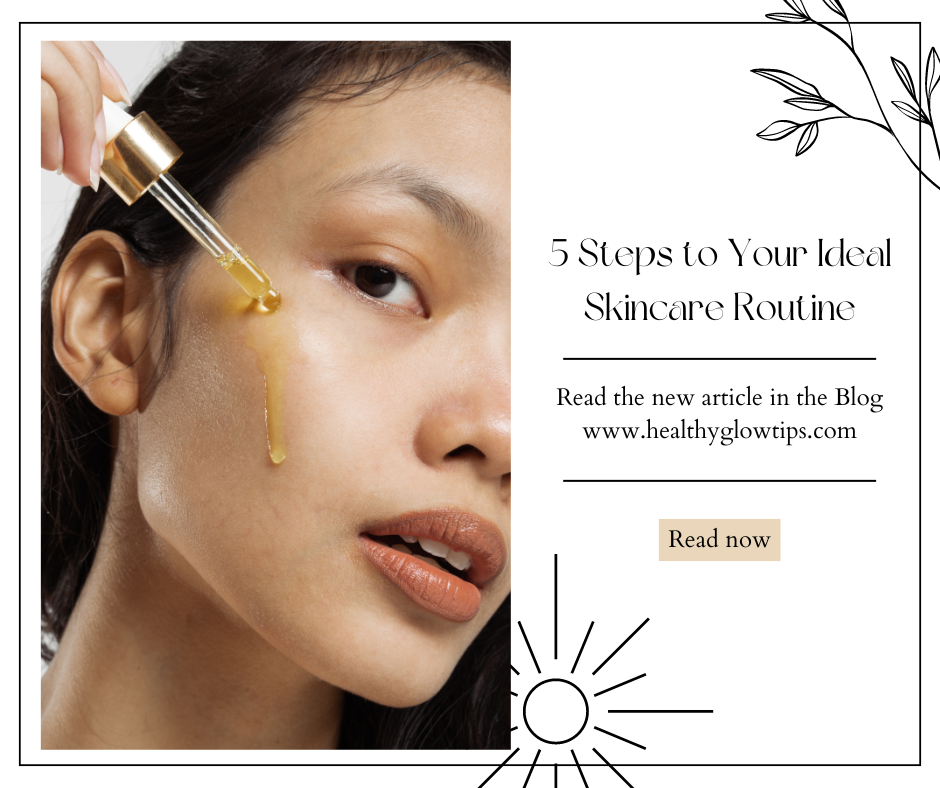Ponytail Facelift — The Complete Guide to This Natural-Looking Non-Surgical Procedure!

Ponytail Facelift: What Is It (And Why Any Even Care)?
These days, many facial rejuvenation patients looking for a non-invasive procedure are more likely to be talking about the ponytail facelift (also called the ponytail lift technique). It is a technique that is inspired by how we all look a little lifted when we brush our hair back into a simple ponytail. Unlike facelifts that require a surgical procedure, ponytail facelift is an easy non-invasive process which if executed properly can deliver yet astounding results.
“The ponytail facelift technique utilizes the fundamental concept of hair positioning and styling to achieve the appearance of a surgical facelift without the surgery.”
The Science of the Technique
Anatomy 101 To understand how the ponytail facelift works, I always start with a little anatomy lesson. Our skin has predictable, natural responses to vector forces pulling in certain directions. By using certain hairstyling methods that give the illusion of upward tension, over time it may help minimize sagginess of skin and create a lift. This principle is the basis of the ponytail facelift technique.
Why People Love the Ponytail Facelift
- Fullnon-invasiveprocedure
- No recovery time needed
- Tailored according to personalized characteristics
- Reversible and adjustable
Cheaper than surgical alternatives - Immediate results
Important Steps to Achieving a Fabulous Ponytail Facelift
Step 1: Preparation
You will need the following supplies before starting the ponytail facelift method;
- High-quality hair brush
- Small elastic bands
- Sectioning clips
- Smoothing serum
- Strong-hold hairspray
- Fine-toothed comb
- Bobby pins
Step 2: Hair Preparation
- Start with clean, dry hair
- Add a little smoothing serum to minimize fly-aways
- Give it a nice brush to get out the tangles
- Type Of Part Hair Based On Face Shape
Case study in strategic sectioning
Hair sectioning is a key component to the success of a ponytail facelift. Start by splitting it into 3 separate parts
Upper Section
Create an ear-to-ear part across the crown of your head. This part will swing through the major portion of the lift.
Middle Section
Take a section between the temples and halfway to your ears It provides tension in the area of cheek and midface lifting.
Lower Section
The hair down on the nape of your neck, what you leave at the back of your head to create that style.
The Lifting Process
Creating Tension Points
- Begin with the upper section
- Fluff up and back the hair.
- Secure it with an elastic band and place it where you found the most tension
- Make sure the pull is strong but not excessive.
→ “The trick to getting the optimal natural outcome is to find the happy medium of tension and relaxation”
Advanced Techniques for Improved Results
Where and How to Apply Depending On Your Face Shape
Oval Faces
Place the ponytail at your crown
Draw softly against the temples
Round Faces
Put the ponytail a little higher.
- Lift on the side — hLength: of.Distance.
Square Faces
Position slightly off center for asymmetrical softness
Add some side-sweep details
How To Keep Up Your Ponytail Facelift
Daily Care Tips
- Choose the right products for your hair
- Do not apply so much tense that you will ruin it
- Allow your hair time out from tight styles
- Add in all those hair, scalp massages with circulation
Long-Term Considerations
You can do these things to maximize the benefits of your ponytail facelift:
- Cycle different styles
This can be avoided with the aid of people protective products earlier than warmth styling - Get regular haircuts in 8 weeks intervals
Within the cosmetic procedures, it can be worth considering periodic professional treatments.
Common Mistakes to Avoid
Tension-Related Issues
- Ponytail too tight
- Elastic bands placed incorrectly
- Skipping protective products
Embrace the opportunity to adapt throughout your day!
Styling Tips for Success
- Choose hair accessories that elevate your look
- Understand and embrace your unique hair type and texture
- Prioritize essential preparation steps
- Take your time to enjoy the process
Elevating Your Experience
Helpful Techniques
Boost the fantastic results of your ponytail facelift by incorporating facial exercises!
- Keep Skincare Routine
- Stay hydrated
- And use good hair products
Professional Tips
- Ask a hairdresser for help
- Get to know your hair type and what it needs
- Invest in professional quality tools and products.
→ Write your outcomes down in the name of progress
Customizing Your Approach
For Different Hair Types
Fine Hair
- Use volumizing products
- Add Texture Pre Styling
- Consider layered techniques
Thick Hair
- Focus on smoothing products
- Use stronger holding tools
Introduce sectional abilities
Curly Hair
- Use moisture products in correct way
- Use gentle securing methods
- Embrace natural texture
Common Issues and Solutions
Comfort Management
Feeling a bit uncomfortable? No worries!
- Try adjusting the tension gradually.
- Opt for wider elastic bands for an easier fit.
- Remember to take breaks frequently.
- A slight change in position can make a big difference!
Flyaways Management
Want your hair to shine? Here’s how:
- Select the perfect hair products for you.
- A light-hold hairspray works wonders!
- Little bobby pins can keep everything in place.
- Checking the weather before styling can help too!
Keys to Long-Term Success
Build a Routine
Create a hair care routine that suits you. Focus on the health of your hair and scalp.
Be Flexible
Stay open to change! Adjust your methods when needed and remember what works best for you.
Prepare for Success
For long-term success, ensure you have:
- Quality hair care products
- Reliable tools
- Protective accessories
- Effective styling products
With these strategies, you’re on your way to thriving hair!
Conclusion
The ponytail facelift technique is a smart and non-invasive way to achieve a lifted, youthful look. With these guidelines, and the details on proper execution that follow in mind you will be able to achieve very impressive results without the use of surgery. Keep in mind that best results are obtained with consistency and correct technique, so feel free to modify the method to fit your lifestyle and preferences.
The best ponytail facelift results are all about knowing your own unique anatomy and tailor-fitting the technique.”
Keep trying this way with the different variations of these techniques for your most appropriate face cut and hair texture. So that with time and practice, you will get the best and natural results for facial rejuvenation.


